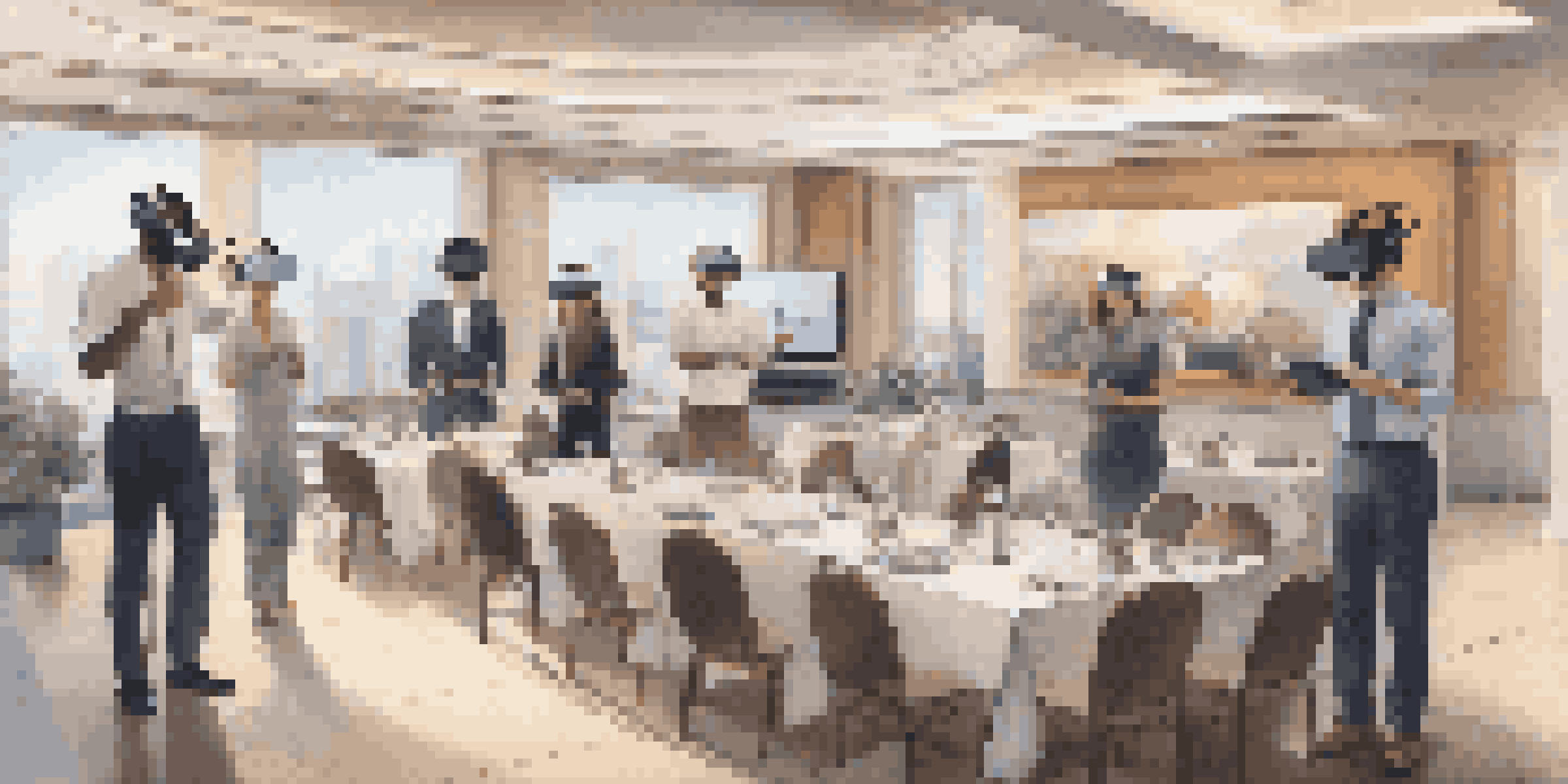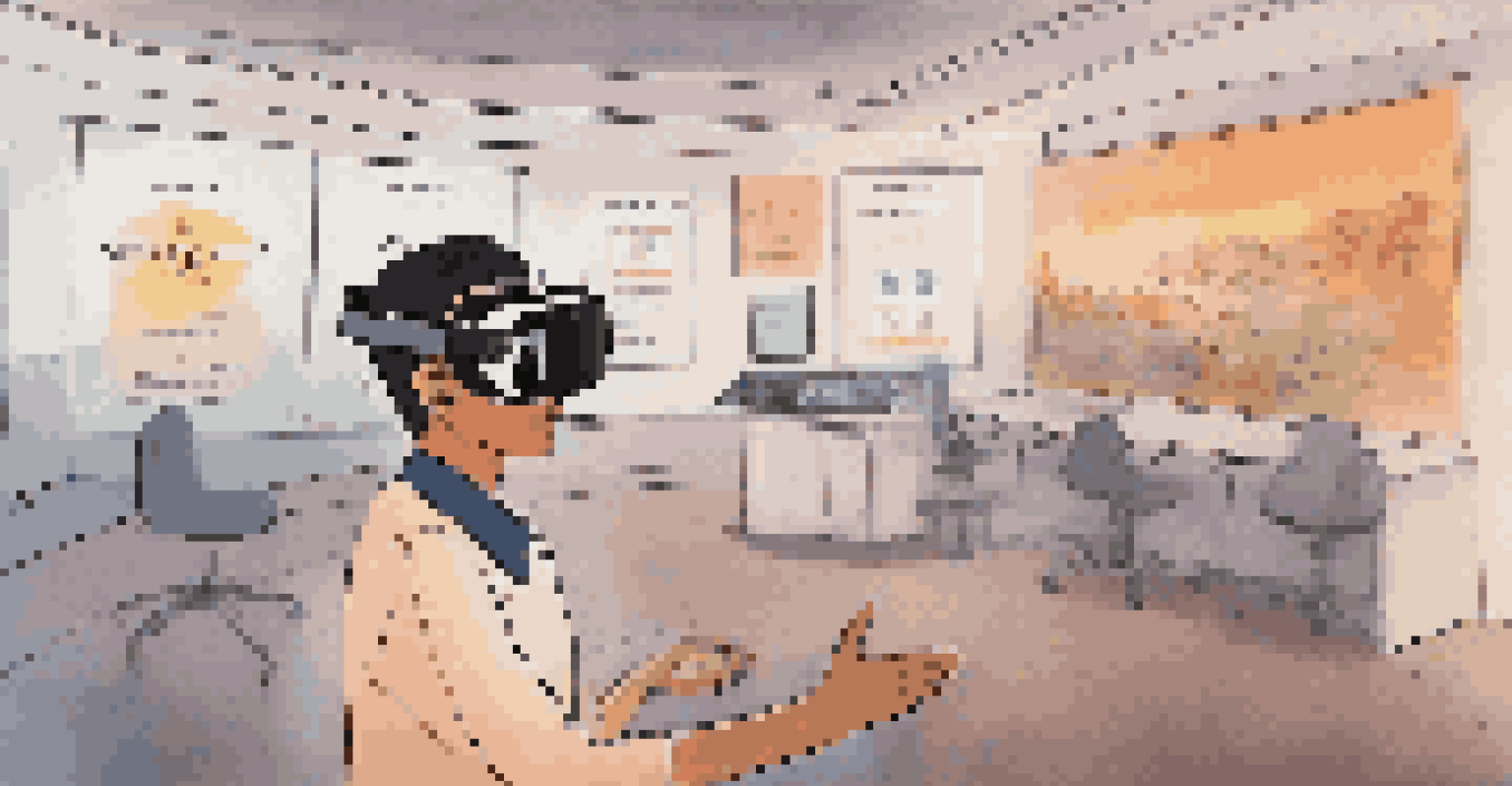The Benefits of VR Training in the Hospitality Industry

Enhanced Customer Service Skills through Immersive Training
Virtual Reality (VR) training allows hospitality staff to practice customer interactions in a controlled, immersive environment. By simulating real-life scenarios, employees can refine their communication skills, learn to handle difficult situations, and respond to customer needs more effectively. For example, a front desk clerk can experience various guest interactions, from check-ins to handling complaints, which builds confidence and competence.
The only way to do great work is to love what you do.
This kind of practice helps in reducing anxiety when dealing with actual guests, as employees have already navigated similar situations in the VR world. The immersive nature of VR makes learning engaging and memorable, leading to better retention of skills. Just like rehearsing a script for a play, the more you practice in a safe environment, the more natural it becomes in real life.
Ultimately, enhanced customer service skills translate into higher guest satisfaction, which is crucial in the hospitality industry. Satisfied customers are more likely to return and recommend the establishment to others, creating a ripple effect of positive reviews and increased business.
Cost-Effective Training Solutions with Virtual Reality
Implementing VR training can significantly reduce costs associated with traditional training methods. For instance, instead of organizing expensive workshops or role-playing sessions that require travel and materials, VR training can be done anywhere with minimal setup. This means less downtime for employees and more flexibility in scheduling training sessions.

Moreover, VR simulations can be reused multiple times, allowing for consistent training experiences without additional costs. Just as businesses save on printed materials by going digital, investing in VR technology can yield long-term savings. The initial investment in VR might seem high, but the overall reduction in training expenses and increased employee efficiency can lead to a quick return on investment.
Immersive Training Boosts Skills
Virtual Reality training enhances hospitality staff's customer service skills through realistic simulations, improving confidence and competence.
In the long run, cost-effective training not only aids in budget management but also contributes to better-trained staff, reducing turnover and improving overall service quality. This creates a win-win situation where the business saves money while employees feel more equipped and satisfied in their roles.
Improved Employee Engagement and Retention Rates
One of the most significant benefits of VR training is its ability to engage employees in their learning process. Traditional training methods can sometimes feel dry and uninspiring, leading to disengagement. VR, on the other hand, immerses employees in an interactive learning environment, making training feel like an adventure rather than a chore.
Training is the foundation of a strong workforce, and investing in your team is investing in your company’s future.
When employees find their training enjoyable, they are more likely to retain the information and apply it effectively in their jobs. For instance, a hotel server can practice serving guests in a bustling restaurant setting, which not only hones their skills but also keeps them motivated. This kind of engagement is crucial for employee satisfaction and contributes to a positive workplace culture.
As employees feel more connected to their training, they are also less likely to leave their jobs, leading to higher retention rates. In an industry where turnover can be high, investing in engaging training methods like VR proves invaluable for maintaining a stable, skilled workforce.
Safe Simulation of High-Stress Scenarios
The hospitality industry often involves high-pressure situations, such as dealing with difficult guests or managing busy service times. VR training offers a safe space for employees to practice handling these stress-inducing scenarios without real-world consequences. This exposure helps them develop coping strategies and quick decision-making skills.
For example, during peak check-in hours, staff can practice managing multiple guests while maintaining a calm demeanor. By facing these challenges in a simulated environment, employees can better prepare for actual situations, making them more resilient. It’s similar to a firefighter practicing drills in a controlled setting to prepare for real emergencies.
Cost-Effective Training Solutions
Implementing VR training reduces traditional training costs and increases employee efficiency, leading to long-term savings for businesses.
Ultimately, the ability to practice stress management in VR can lead to a more composed and efficient service team. This not only enhances employee confidence but also improves the overall guest experience, as staff can handle high-pressure situations with grace and professionalism.
Tailored Training Programs for Diverse Roles
Every role in the hospitality industry comes with its unique set of challenges and responsibilities. VR training allows for customized programs tailored to specific positions, whether it’s front desk staff, housekeeping, or restaurant servers. This ensures that employees receive the most relevant training to excel in their particular roles.
For instance, a VR program designed for housekeeping can focus on cleaning protocols, safety measures, and guest interaction, while front desk training may emphasize check-in procedures and conflict resolution. By catering training to individual roles, employees can feel more equipped to meet their specific job demands, increasing their effectiveness.
Tailored training not only helps employees perform better but also boosts their morale. When they see that the training reflects their daily tasks, it resonates with their experiences and enhances their learning, ultimately leading to a more skilled and confident workforce.
Real-Time Feedback and Performance Tracking
One of the standout features of VR training is the ability to provide real-time feedback to employees. As they navigate through various scenarios, they can receive instant evaluations on their decisions and actions, allowing them to learn and adjust on the fly. This immediate response is crucial for reinforcing positive behavior and correcting mistakes.
For instance, if a server forgets to greet a guest in a simulation, they can receive prompts to improve their customer interaction skills. This kind of feedback loop helps reinforce learning and ensures that employees are aware of areas needing improvement. It’s like having a coach who provides insights during practice sessions, enhancing overall performance.
Engagement Leads to Higher Retention
Interactive VR training keeps employees engaged, resulting in better information retention and higher retention rates within the workforce.
Moreover, performance tracking within VR training can help managers identify strengths and weaknesses across their team. This data-driven approach allows for more informed decisions regarding ongoing training and development, ensuring that each employee continues to grow and contribute effectively.
Increased Accessibility and Flexibility in Training
VR training offers unparalleled accessibility and flexibility, allowing employees to learn at their own pace and on their own schedule. Unlike traditional training sessions that require everyone to be present at a specific time and place, VR training can be accessed from various locations. This is especially beneficial for large hospitality chains with multiple locations.
Employees can log in to their VR training modules whenever they have time, whether it’s during a break or after their shift. This flexibility is akin to having a library of resources available at any time, making learning more convenient and less stressful. It accommodates different learning styles and schedules, ensuring everyone can engage with the material.

Ultimately, increased accessibility leads to a more knowledgeable workforce. When employees can take ownership of their learning journey, they are more likely to feel empowered and engaged, resulting in improved service delivery.
Future-Proofing Staff Skills for a Digital Age
As the hospitality industry evolves, so do the skills required to thrive in this fast-paced environment. VR training helps future-proof staff skills by incorporating the latest technology and trends into their learning. By familiarizing employees with digital tools and environments, they are better prepared for changes in the industry.
For example, as more hotels adopt app-based check-ins or digital concierge services, training staff in VR can help them navigate these technologies seamlessly. This proactive approach to training ensures that employees are not only competent in their current roles but also adaptable to future developments. It’s like teaching athletes to remain versatile in their training to compete in various events.
In conclusion, VR training serves as a vital tool for developing a workforce that is ready to meet the challenges of tomorrow. By investing in the future of training, hospitality businesses can ensure their staff remains competitive and capable, ultimately enhancing the guest experience.